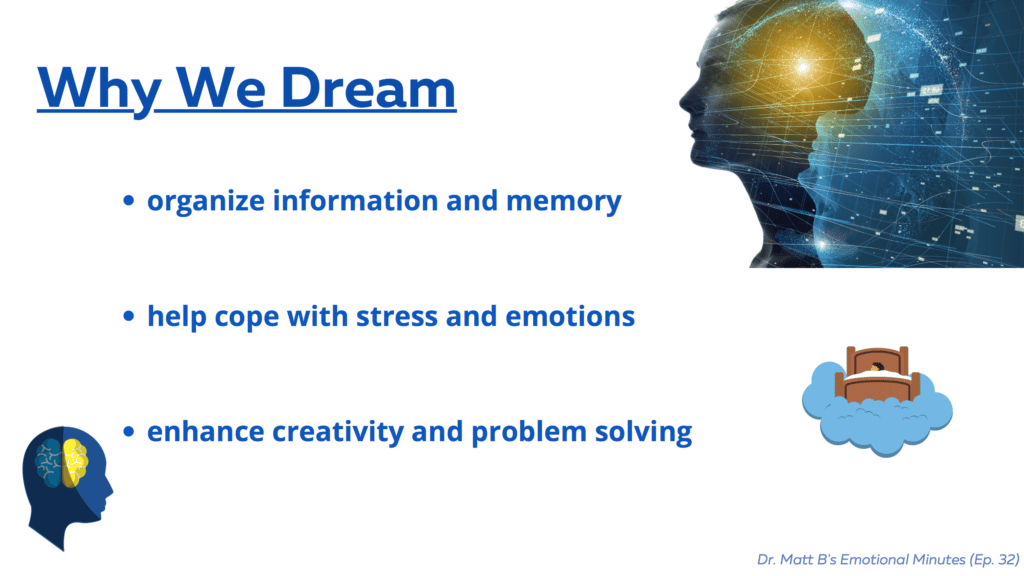Why do we dream? What do my dreams mean?? Why do I have nightmares? Dreams and why we dream have puzzled philosophers, scientists, and pretty much everyone forever.
Being picked first (or last) for the team paddle dance contest, trains in a tunnel, going on a hike with pig-headed flies. Some are sweet dreams and some are lucid dreams, but many of them don’t seem like normal or common dreams.
Dreams have been thought to symbolize all sorts of things. Check out our latest video on new discoveries about dreams and why we dream. And why dreams sometimes seem so weird! You also can see our related recent post on sleep, insomnia, and how to get better sleep here.
For more info on dreaming, there is a great book with tons of research-based information on dreams and another great book that combines info on both sleep and dreams. Fascinating stuff – enjoy!
Welcome Back, I’m Dr. Matt B and these are your Emotional Minutes. In a recent episode we talked about sleep and how to get better sleep, so today we’re talking about dreams. People often wonder about dreams. Why do we have dreams? What do certain dreams or content of my dreams mean?
History of Dream Theories
In stressful or unusual times, dreams can start to seem a little weirder or a little stranger. Many old theories about dreams focus on dreams giving insight on who you are, your beliefs, sexuality and relationships, or even the future. Newer research has found that dreams have a number of important functions for our day-to-day lives.
Organizing Thoughts and Memories
One of the main functions of dreams is believed to be organizing thoughts that you have throughout the day. In doing so, dreams help your mind organize those thoughts and memories in a way that makes sense.
Through reshuffling what’s important to remember from the day, reinforce memories of helpful and important information; This information can then be recalled or used later for experiences that you have in the future.
Coping with Stress and Emotions
Dreams also help us cope with difficult things, events, emotions, and stressful situations that occur in our lives. This is because of our dreams’ ability to organize information helps us make sense of stressful situations.
Sometimes things like nightmares occur. This is the brain trying to cope and make sense of stressful or traumatic experiences that happen throughout the day. Of course, it can be difficult to experience nightmares and we might wake up in the middle of the night.
Inspiring Creativity and Problem Solving
Another function of dreaming is to inspire creativity and openness to problem solving or approaches to new problems. If there’s something that we’re unsure of in our lives, dreams can often give us clarity about that; dreams may even give us ideas we don’t consider on how to handle those situations or get the best outcome.
Dreaming can also bring new ideas to light or set the stage for better problem solving throughout the day. It can also encourage more creative and open ways to approach the things in your lives.
Dream Control
People often wonder how to manage or control dreams. For example, how can I control what I dream about? Or maybe who is in my dreams? There is evidence that writing concise statements before bed can influence what you dream about. However, there’s still much that’s not known about dreaming and how to influence dreams.
Some researchers say that it’s better to allow your dreams to take their own course. This is mainly because of the function of dreams is to organize information and help cope with emotions. Considering these functions, it might be better to allow yourself to dream however you might naturally dream.

When Dreaming Becomes Problematic
If you’re experiencing things like nightmares, heavy anxiety, post-traumatic stress or anything like that, I always recommend contacting a mental health provider. Working with a mental health provider to look at those experiences can help reduce distressing dreams in the long run.
Further Reading on Dreams and Why We Dream
To learn more about this topic, here are a couple good, research-based books I recommend. When Brains Dream by Antonio Zadra and Robert Stickgold has a lot of detail on dreams and specifics on what we know about dreams so far. Why We Sleep by Matthew Walker goes into less detail about dreams, but has also good information about sleep.



